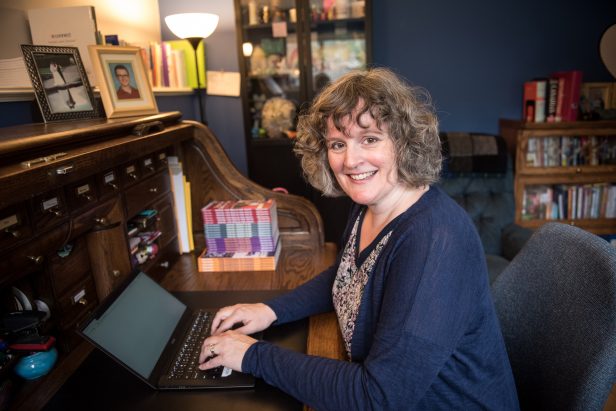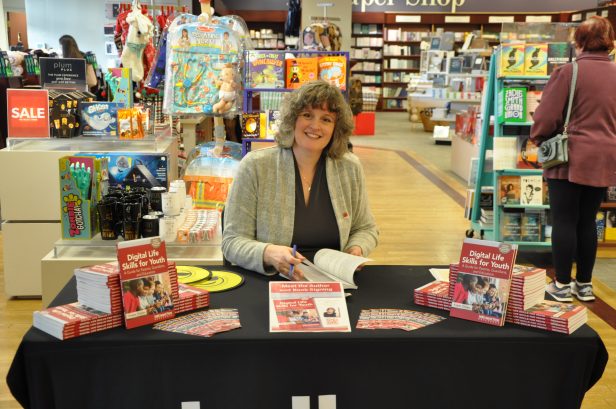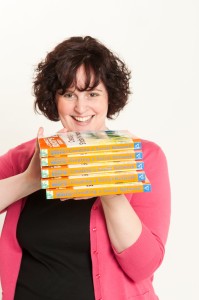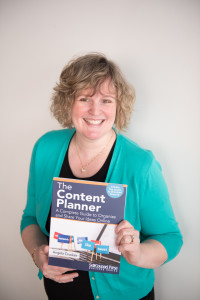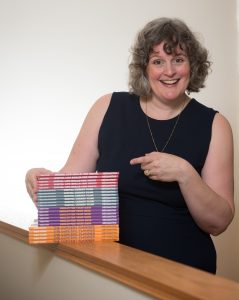Today is my tenth anniversary as a published author. Just writing that feels surreal as I reflect on the ten years since The Complete Idiot’s Guide to Creating a Social Network was released. In a decade, I’ve published six books and I’m writing my next book now.
Over the years, I’ve learned a lot of things about writing and publishing — even more so if you count my publishing degree and work in book retail, book publishing, and book advocacy. I thought I’d share ten of the lessons I’ve learned along the way. I think you’ll agree many of them are universal truths for writing and for life.
1. Writing Is Work
To be a writer you need to sit down and write. That seems simple enough but in practice it can be tough to do. Sometimes, I’m not sure what to write and other times the words just won’t come. Then there’s self-doubt, impostor syndrome, and the critics. Sigh.
Life gets in the way, too. Household chores, parenting responsibilities, and digital distractions reduce writing time. My biggest writing hurdle came in the months after my mom died. I couldn’t write anything. Thankfully, my publisher was gracious about missed deadlines and The Content Planner was still published. Phew!
There’s a different layer of writing work when you collaborate with a co-author. Kim Plumley, Peggy Richardson, and I shared the work of our audiobook but that was complicated by being in different cities, at the time. A few years later, Vicki McLeod and I experienced a different depth of work as we co-wrote Digital Legacy Plan. It was challenging, at times, to navigate our own experiences of death and dying in the 21st century.
Thanks to these ten years, I’ve built up a lot of techniques to overcome these impacts on my writing, including this one. Maybe I should develop a workshop on overcoming distractions for other writers? Hmm …
The lesson: Write on.
2. Editors Are Everything
Writing books means working with editors. For my first book, I worked with seven different editors. It was quite the process! I was a new author working with a gigantic publisher. Through the process, I made the journey from the desk of the acquisitions editor, to the development editor, to the technical editor, and so on, with reasonable grace. I also learned that no one sees all their writing mistakes. You need outside eyes to get to effective writing.
For my more recent books, I’ve worked closely with one editor, in particular. Eileen Velthuis has been an extraordinary partner in crafting my books. She knows my voice and catches my frequently repeated mistakes. (Sorry about the homonyms, Eileen!) Best of all, she asks the perfect questions to help me see what’s missing. My work is better because her work is outstanding.
The lesson: You need a good editor.
3. You Need Cheerleaders
Writing is lonely work. No matter how engaging your topic or how dedicated you are, you’re still alone at your desk. Putting words on the page is exciting but the process also comes with tears of frustration, desk thumping, and tech stress. Here are some ugly truths: I’ve thrown papers around my office, yelled at my husband, slammed doors, and burst into tears at least once for every book I’ve written.
To counteract the loneliness and minimize the outbursts, you need cheerleaders. Your squad of people will love and encourage you no matter what. My cheerleaders gather in different places including a secret Facebook group, a Signal text thread, frequent phone calls, and, thankfully, caring embraces and cups of tea (from my occasionally beleaguered husband).
The lesson: Embrace your squad and let them embrace you.
4. Read EVERYTHING!
My dad can confirm that I read under the covers with a flashlight when I was a little girl. Mysteriously, my flashlight never ran out of battery power. Dad might know something about that, too.
I loved to read then and I read lots now — for research, for relaxation, and for curiosity’s sake. The more I read, the more I learn this truth: You don’t know what you don’t know. There’s always something to learn! Every month I read novels, nonfiction, magazines, and social media. I also find time to read essays, poetry, cartoons, and more.
Reading makes me a better writer in two ways. On the one hand, I’m experiencing other points of view. I haven’t lived the life of a person of color (POC), an Indigenous person, or as someone who identifies as male. It’s good to see how others see the world. At the same time, I’m seeing the craft of writing applied in a hundred different ways. For example, while there are rules of grammar and style guides to follow, talented writers also break those conventions to convey their meaning with impact.
The lesson: Read widely and as much as you can.
5. Writing Lessons
As with everything, the more you learn about a subject the more you realize what you have yet to learn. I learn by doing and through observation. The more I write the easier it gets. The more I read other writers, the easier it gets. I’m always learning.
Writing skills don’t mature without ongoing practice and study. Beyond high-school grammar lessons, I made sure to invest in training as a writer. This included assorted workshops and, more formally, my technical writing certification. Without doubt, I have many more writing workshops in my future.
The lesson: Be a lifelong learner.
6. Exercise Your Writing Muscle
I’ve been writing for practically my entire life. The first thing I had published was in my fourth grade class newsletter and the next year I wrote an award winning poem — about prepositions. #TrueStory
When I got to high school I was a reporter (and eventually co-editor) of my high school newspaper. Later, I went on to write university essays, research papers, press releases, several books, and countless social media posts.
Many writer friends agree that writing is a workout. We have to wield our pens and/or our keyboards regularly to stay in fine form. If I stop writing for a while, it takes time to get back in the groove. My writing practice includes a variation on Julia Cameron’s “morning pages,” regular snail mail correspondence, and this blog, as well as ongoing writing in my weekly lesson plans. My books alone total about a quarter million words so far but I imagine I could round that up to a million words written, if I’d kept a tally.
The lesson: Write regularly.
7. Marketing Skills Are Essential
Over my career, I’ve marketed thousands of books on a huge range of nonfiction topics. I’ve helped promote new Canadian authors and the books of globally recognized celebrities. While publishers invest in some marketing work, the long-haul promotion is up to the author. I became an author with a kit bag filled with marketing know-how but I haven’t always done the right things to promote my own books.
One of my biggest problems was that I didn’t see myself as an author, even after my first book was published. It took years before writer friends convinced me I am an author.
I beat myself up sometimes because I’ve launched failed newsletters, neglected this blog, and promised a never-released podcast. On the other hand, I’ve done well with media interviews, speaking engagements, teaching opportunities, and more. I try to give myself some grace. I, also, have to remember that the marketing things I haven’t done are really the marketing things I haven’t done yet.
The lesson: You can always do more promotion.
8. Invest in Author Photos
Other than writing, one of the best author things I’ve done is invest in great photos. They appear on my book covers, website, media interviews, and so on. For more than a decade I have worked with Wendy D Photography. I love how her style creates flattering and engaging headshots and editorial photos. Here are some then and almost-now moments:
The lesson: You look marvelous!
9. Money Isn’t Everything
To quote David K. Foot, my years as a published author have been “boom, bust, and echo.” Writing books is a big investment of time. It is also an exercise in patience while you wait for royalty cheques.
Let’s be honest, too: Some authors see no real monetary profit.
While my books have been profitable, they’ve also given me indirect financial opportunities including teaching assignments, paid workshops, affiliate income, library talks, and other appearances. Beyond money, books have also given me the opportunity to meet amazing people and to experience interesting events. Bottom line: My life is richer for being an author.
The lesson: Most authors don’t get rich from books, but being the person who wrote the book opens other doors.
10. Share What You Know
I freely share what I know about writing, publishing, and more. I’ve been frustrated for years about the amount of misinformation circulating that preys on aspiring writers. I worry about the writers who don’t know what’s a legitimate publishing opportunity and what’s a scam offer. I hate to see writers bilked out of thousands of dollars for a single project with little hope of recouping their investment, left with a low quality book product tainting their reputation.
For five years, I worked closely with Kim Plumley and Peggy Richardson. Together, we were “The Book Broads.” We worked hard to share our collective knowledge about writing and publishing. We even self-published an audiobook. It was a guide to creating your marketing plan before you write the book. While The Book Broads have been dormant for several years, we’re exploring some potential future plans.
The lesson: Shared knowledge makes us all better.
Celebrating Ten Years
I’m going to spend this day celebrating ten years as a published author. I’ll start the day going live on my Facebook page and end the day partying with my friends and colleagues at the launch party for The Big Ready*. In between, I’ll be on Instagram and spend time with friends at RevolutionHER and Phlywheel digitally. I’ll raise a glass of something bubbly and hope you will, too. Let’s connect online and celebrate my author anniversary and your successes, too! We can chat on social media and one-on-one via Zoom. You can even send me snail mail if that’s your jam. (I love getting cards and letters!) Let’s connect soon.
**Full disclosure: If you make a purchase using this affiliate link, I’ll earn a commission at no extra cost to you.
